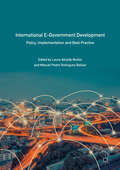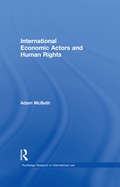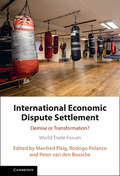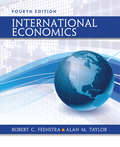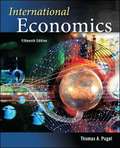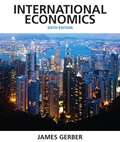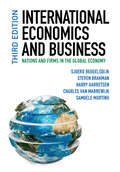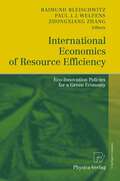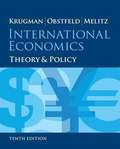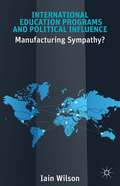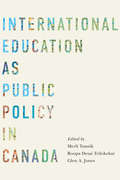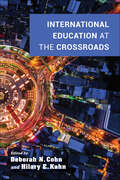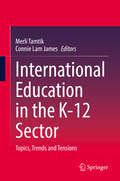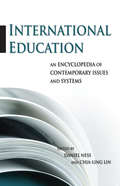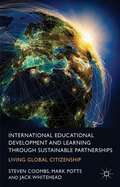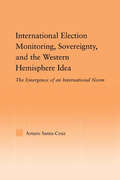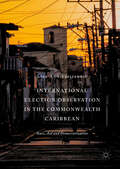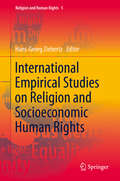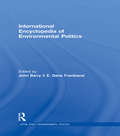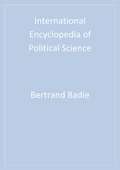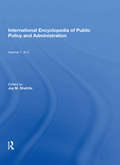- Table View
- List View
International E-Government Development
by Manuel Pedro Rodríguez Bolívar Laura Alcaide MuñozThis book provides an examination of e-Government frameworks and maturity stages in governments around the world, including an overview of the legal frameworks that have supported them. Divided into three sections, the first part of this book analyses the theoretical context of current policies, codes of best practice and their implementation. The second section presents case studies which bring key issues to the fore including open government, privacy protection, social media, democracy, systems failures, innovations in inter-organizational e-government projects, and open data systems. The authors demonstrate the importance of the successful implementation of e-Government for improving managerial efficiency, public service delivery and citizen engagement, with special attention given to developing countries. The book concludes by drawing out the lessons learned from the latest research and recommending solutions for improving the implementation of e-Government in the future, thereby helping to achieve more transparent, participative and democratic societies. This book will provide an invaluable resource for researchers, policy-makers, public managers, international organizations and technical experts.
International Economic Actors and Human Rights (Routledge Research in International Law)
by Adam McBethIn noting that the actions of entities other than states in the economic arena can and often do have a profound effect on human rights, this book poses the question as to how international human rights law can and should address that situation. This book takes three very different categories of international actor – the World Trade Organization, the international financial institutions (World Bank and IMF) and multinational enterprises – and analyses the interaction of each category with human rights, in each case analysing the interaction of the different fields of law and seeking to identify a role for international human rights law. Adam McBeth concludes that each of the selected international economic actors can and should be considered to operate within a holistic system of international law, including human rights obligations, but that changes in the operations and the accountability mechanisms for each actor are necessary for the practical implementation of that approach. While written from a human rights perspective, the underlying theme of the book is one of engagement and harmonisation rather than condemnation. It provides valuable insight for those who approach this topic from a background of international trade law, commercial law or general international law, just as much as those who have a human rights background. International Economic Actors and Human Rights will be of great interest to those studying or working in any field of international economic law, as well as human rights scholars and practitioners.
International Economic Dispute Settlement: Demise or Transformation?
by Manfred Elsig Van den Bossche, Peter Rodrigo PolancoThe post-Cold War era has seen an unprecedented move towards more legalization in international cooperation and a growth of third-party dispute settlement systems. WTO panels, the Appellate Body and investor-state dispute settlement cases have received increasing attention beyond the core trade and investment constituencies within governments. Scrutiny by business, civil society, academia, and trade and investment experts has been on the rise. This book asks whether we observe a transformation or a demise of existing institutions and mechanisms to adjudicate disputes over trade or investment. It makes a contribution to the question in which direction international economic dispute settlement is heading in times of change, uncertainty and increasing economic nationalism. In order to do so, it brings together chapters written by leading researchers and experts in law and political science to address the challenges of settling disputes in the global economy and to sketch possible scenarios ahead of us.
International Economic Law after the Global Crisis
by C. L. Lim Bryan MercurioThis collection explores the theme of fragmentation within international economic law as the world emerges from the 2008 global financial crisis, the subsequent recession and the European sovereign debt crisis which began in early 2010. The post-crisis 'moment' itself forms a contemporary backdrop to the book's focus on fragmentation as it traces the evolution of the international economic system from the original Bretton Woods design in the aftermath of the Second World War to the present time. The volume covers issues concerning monetary cooperation, trade and finance, trade and its linkages, international investment law, intellectual property protection and climate change. By connecting a broad, cross-disciplinary survey of international economic law with contemporary debate over international norm and authority fragmentation, the book demonstrates that this has been essentially a fragmented and multi-focal system of international economic regulation.
International Economic Law and National Autonomy
by Meredith Kolsky Lewis Susy FrankelInternational commitments may sit uneasily with national pressures in the best of times. This age of economic uncertainty brings these tensions into sharper relief. This volume draws together thirteen analyses of this tension in a wide array of contexts, including each of the three main pillars of the World Trade Organization, international investment law and arbitration, and the international financial institutions. The essays feature internationally recognised experts addressing topical examples of international economic law obligations clashing with domestic political interests. For example, Professor Robert Howse, of New York University Law School, addresses issues of globalization and whether international and national interests can in today's world be considered separate, while Ko-Yung Tung, the former Director-General of the World Bank, looks at trends in investment treaty arbitration and considers what the future may hold in light of the recent financial crisis, the rise of China as an economic powerhouse, and other factors.
International Economics
by Robert C. Feenstra Alan M. TaylorDeveloped in the classroom by two of the most prominent researchers in the field, Feenstra and Taylor’s International Economics uses engaging applications to provide a modern view of the global economy for a modern audience. Most international economics textbooks emphasize theory and the economies of advanced countries. Feenstra and Taylor combine theoretical coverage with empirical evidence throughout, while reflecting the realities of the global economy by covering emerging markets and developing countries (India, China, Southeast Asia). The new edition has been thoroughly updated to include new data and Applications, as well as many new Headlines to reflect the rapid changes in international economics during the last three years. The 4th Edition includes the latest on opening relations with Cuba, immigration and Europe’s refugee crisis, the effect of NAFTA on wages and employment, job polarization, quicksourcing, China’s problems, and the debate in Britain about leaving the European Union.
International Economics (Fifteenth Edition)
by Thomas PugelInternational Economics, 15e continues to combine rigorous economic analysis with attention to the issues of economic policy that are alive and important today in this field. Written in a concise and readable format, Pugel uses economic terminology when enhancing the analysis so that the reader can build their understanding of global economic developments and evaluate proposals for changes in economic policies. The text is informed by current events and includes the latest in applied international research, all the time avoiding jargon for jargon's sake. Like earlier editions, Pugel also places international economics events within a historical framework. The overall treatment continues to be intuitive rather than mathematical and is strongly oriented towards policy.
International Economics (Sixth Edition)
by James GerberA principles-level introduction to international economics that is accessible to all majors. This book is also suitable for readers interested in the field of international economics. <p><p> International Economics uses a rich array of case studies to illuminate economic institutions and policies as well as recent developments in the global economy—without readers having to rely on a prerequisite knowledge of higher-level math. Further, the book’s flexible approach—with self-contained chapters and comprehensive coverage—allows instructors to adapt the text easily to a wide range of syllabi.<p> The sixth edition preserves the organization and coverage of the fifth edition and adds a number of updates and enhancements. All tables and graphs have been updated and every chapter begins with a list of student learning outcomes. Chapter 13, The United States in the World Economy, is heavily revised and refocused towards U.S. international economic relations, including NAFTA, but adds material on other trade agreements, including a new case study on preferential agreements such as the African Growth and Opportunity Act.
International Economics and Business
by Sjoerd Beugelsdijk Sjoerd Beugelsdijk Steven Brakman Harry Garretsen Charles Van Marrewijk Steven Brakman Harry GarretsenWith a new title (following the successful first edition of Nations and Firms in the Global Economy), this second edition undergraduate textbook combines the dual perspectives of international economics and international business, providing a complete overview of the changing role of nations and firms in the global economy. International Economics and Business covers the key concepts typically included in an introductory course on the global economy, supported by contemporary case studies from the international business world. The result is a practical guide to the world economy for undergraduate students in economics and business, also suitable for students in other social science disciplines. Updated to include the latest theoretical insights, data and case studies, with online quizzes, data exercises and additional reading, International Economics and Business is a lively and engaging textbook providing a complete and practical understanding of international economics and globalization through a uniquely integrated lens.
International Economics and Business: Nations And Firms In The Global Economy
by Sjoerd Beugelsdijk Charles Van Marrewijk Steven Brakman Harry Garretsen Samuele MurtinuInternational Economics of Resource Efficiency: Eco-Innovation Policies for a Green Economy
by Paul J.J. Welfens Zhongxiang Zhang Raimund BleischwitzHuman societies face a threatening future of resource scarcity and environmental damages. This book addresses the challenge of turning these risks into opportunities and policies. It is a collection of high level contributions from experts of sustainable growth and sustainable resource management. Focussing on economics, sustainability, technology and policy, the book highlights system innovation, leapfrogging strategies of emerging economies, possible rebound effects and international market development. It puts natural resources centre stage and will make an important contribution to achieving the goal of a 21st century Green Economy.
International Economics: Theory And Policy (Tenth Edition)
by Maurice Obstfeld Marc Melitz Paul R. KrugmanInternational Economics: Theory and Policy provides engaging, balanced coverage of the key concepts and practical applications of the two main topic areas of the discipline. For both international trade and international finance, an intuitive introduction to theory is followed by detailed coverage of policy applications. With this new tenth edition, the author team of Nobel Prize-winning economist Paul Krugman, renowned researcher Maurice Obstfeld, and Marc Melitz of Harvard University continues to set the standard for International Economics courses. <p><p> This program provides a better teaching and learning experience-for you and your students. It will help you to: * Personalize learning with MyEconLab: This online homework, tutorial, and assessment program fosters learning and provides tools that help instructors to keep students on track. * Reveal theory and applications of trade and finance via a unified structure: Balanced coverage of theory and applications aids student retention and highlights the relevance of course material. * Give students learning tools to master course material: Numerous in-text learning resources engage students and encourage further exploration of course topics. * Provide the most updated coverage: Thoroughly updated content ensures that students are up to date on key economics issues.
International Education Programs and Political Influence
by Iain WilsonExchange programs are often considered to create goodwill for host countries among foreign citizens - yet is this the case? Drawing on a wealth of research with participants and alumni of exchange programs, Iain Wilson shows that the pursuit of goodwill receives little return and distracts these programs from the benefits they are able to deliver.
International Education and Foreign Languages: KEYS TO SECURING AMERICA'S FUTURE
by National Research Council of the National AcademiesInternational Education and Foreign Languages reviews the Department of Education’s Title VI and Fulbright-Hays Programs, which provide higher education funding for international education and foreign language programs. This book offers a timely look at issues that are increasingly important in an interconnected world. It discusses the effect of the nation’s lack of expertise in foreign languages and cultural knowledge on national security and global competitiveness and it describes the challenges faced by the U.S. educational system and the federal government in trying to address those needs. The book also examines the federal government’s recent proposal to create a new National Security Language Initiative, the role of the Department of Education, and current efforts to hold higher education programs accountable. This book provides information and recommendations that can help universities, educators, and policy makers establish a system of foreign language and international education that is ready to respond to new and unanticipated challenges around the world.
International Education as Public Policy in Canada
by Merli Tamtik, Roopa Desai Trilokekar, and Glen A. JonesIn the early twenty-first century international education emerged as an almost ubiquitous concept within discussions of educational curriculum; the objectives of schools, universities, and colleges; and government policies for K–12 and higher education. Although far from a new phenomenon, many jurisdictions now view international education as a highly competitive global industry. This book provides a comprehensive analysis of international education policy in Canada, tracing the complex history of when, how, and why it emerged as a policy area of strategic importance. Illuminating a uniquely Canadian perspective, influenced by regional interests and federal-provincial tensions, International Education as Public Policy in Canada addresses challenging questions: Why was Canada a latecomer in addressing this policy issue? What is the relationship between international education and Canadian immigration policy? How did international education develop as a major Canadian industry? The resulting essays from leading scholars contribute not only to the growing Canadian literature on international education policy but also to a critical, global conversation. Contemplating where the Canadian story of international education is headed, International Education as Public Policy in Canada calls for a broader debate on ethical practices in internationalization, focusing on inclusion, equity, compassion, and reciprocity.
International Education at the Crossroads (Well House Books)
by Deborah N. Cohn and Hilary E. KahnInternational Education at the Crossroads captures the essence and complexity of international education in an interconnected and globalized world. Written by leading scholars, international educators, and policy makers, the 26 essays in this volume take stock of the unpredictable landscape of international education and demonstrate why international higher education is more essential now than ever before. Responding to a timely global moment where education and international engagement are being redefined and practiced in new ways, the authors call for a reconsideration of paradigms and critical reflection of the entire field of international education. At the same time, the authors show how international education is an imperative for the future of learning and the world, and also, crucially, that this work cannot be done in a silo. International Education at the Crossroads offers readers a chance to join in the conversation that is as global as it is meaningful in communities, the lives of learners, and institutions around the world. International education requires that everyone the world over work together to produce new knowledge, to navigate the "crossroads," and to collectively chart the directions in which the field will move into the future.
International Education in the K-12 Sector: Topics, Trends and Tensions
by Merli Tamtik Connie Lam JamesThis edited volume focuses on K-12 international education in a global context and examines trends, emerging topics, and prevalent tensions. It considers the rapidly growing phenomenon across a variety of country contexts in a way that can convey both empirical evidence and insights into theorization and practical debates. Contributors touch upon a range of emerging trends in K-12 international education globally, including student mobility, curriculum design, language learning, methodological considerations, and policy considerations through a holistic and comprehensive approach. The book also applies a critical decolonial lens in examining K-12 international education by inviting readers to think critically about issues of power, privilege, equity, and social justice in trying to foster a more informed and socially responsible approach to international education. Ultimately, the book attempts to move beyond a one-size-fits-all approach in order to embrace the complexity of issues that emerge from international education involving vulnerable populations. The book is grounded in institutional theory, which allows to explore the complex web of institutional norms, values, and behaviors that are shaping the experiences through international education across the different chapters in this volume. As an edited volume, authored by academic experts and practitioners from around the world, this book provides the most recent and up-to-date account on documenting developments related to K-12 international education internationally. Through contributing significant evidence across international contexts, the book raises new questions and offers new perspectives to the field, opening conversations both within and across governments and non-governmental stakeholders such as educators, students and parents.
International Education: An Encyclopedia of Contemporary Issues and Systems
by Daniel Ness Chia-Ling LinThis encyclopedia is the most current and exhaustive reference available on international education. It provides thorough, up-to-date coverage of key topics, concepts, and issues, as well as in-depth studies of approximately 180 national educational systems throughout the world. Articles examine education broadly and at all levels--from primary grades through higher education, formal to informal education, country studies to global organizations.
International Educational Development and Learning through Sustainable Partnerships
by Jack Whitehead Steven Coombs Mark PottsAddressing the debate around what makes a good citizen, this work proposes a new form of post-colonial citizenship education which can be applied in any cultural setting. International educational partnerships provide the opportunity for participants to live out values such as cultural empathy and thus demonstrate their right to citizenship.
International Election Monitoring, Sovereignty, and the Western Hemisphere: The Emergence of an International Norm (Studies in International Relations)
by Arturo Santa-CruzThis book traces the process by which national elections became international events or, more precisely, what the effects of this process are on state sovereignty. Contrary to the conventional wisdom in International Relations - to judge by the neglect of this phenomenon in the literature - this book argues that the study of IEM does not belong only in the field of comparative politics. As a system-wide phenomenon, IEM should not be restricted to the study of purely domestic politics or of foreign policy. This book contends that sovereignty has been partially transformed by the recent emergence of IEM. Furthermore, the author locates the origins of this change in the Americas, claiming that the western hemisphere's normative structure - what Santa-Cruz calls the Western Hemisphere Idea (WHI) - was particularly conducive to this new understanding of state sovereignty. This is the first work to engage the issue of IEM in a comprehensive manner from a theoretical perspective. International Election Monitoring, Sovereignty, and the Western Hemisphere covers a broad and relevant scholarly literature, and the cases comparisons widen the book's appeal, since they illustrate a useful range of experience.
International Election Observation in the Commonwealth Caribbean
by Lisa Ann VasciannieThis book examines the practice of international election observation in a Caribbean context. It presents a survey of the Commonwealth Caribbean perspective and a concise case study of Guyana between 1964 and 2015. This research traces the roots of election observation and how this practice became integrated into the landscape of Caribbean electoral politics. More specifically, the study examines the process by which election observers have become key actors in elections in the Commonwealth Caribbean. One of the issues the book contemplates is why Caribbean countries accept the imposition of observation within the context of sovereignty. The case of Guyana and other Anglophone Caribbean states shows the costs of not having observers have been multidimensional and have eclipsed concerns of respecting state sovereignty.
International Empirical Studies on Religion and Socioeconomic Human Rights (Religion and Human Rights #5)
by Hans-Georg ZiebertzSocioeconomic rights include rights with regard to social security, labour and employment, as well as cultural rights which may be regarded as a shield for the protection of human dignity, especially of specific groups, such as women, children and refugees. The enforceability of socioeconomic rights clearly distinguishes them from other rights. These rights need, perhaps more than others, the support of civil society. Because states have leeway in how resources are distributed, civil society has a major impact on what resources are used to fulfil socio-economic rights. One of the actors in the public arena are religious traditions, respective Churches. Most of them have developed ethical standards for individual conduct and rules for living together in society based on their basic scriptures. All three monotheistic religions, Judaism, Christianity, and Islam, are marked by a caring engagement for the poor, the sick, the old and the foreign. From an empirical perspective, the general research question of this volume is how young people understand and evaluate socioeconomic rights and to which degree religious convictions and practices are connected with attitudes towards these human rights. Can religion be identified as a force supporting the human rights regime and which additional concepts strengthen or weaken the consent to these rights? The richness of empirical data contributes to a better understanding how socioeconomic rights are legitimated in the opinion of more than 10.000 respondents in 14 countries.
International Encyclopedia of Environmental Politics
by John Barry E. Gene FranklandWhy care about the environment? Is the earth's climate really changing for the worse? What are CFCs exactly? And who or what is the WTO? What are the causes of environmental problems? Who are the main actors, and what are the main ideas and issues in international environmental politics? Which countries have the best/worst environmental record and policies?The International Encyclopedia of Environmental Politics is the essential reference source to enable all those with an interest in the politics of the environment - particularly students and academics working within political science - to answer these questions, and to explore many other related topics in international environmental politics. It will be welcomed as an essential teaching resource and a trusty companion to independent study.Written by a team of international experts, the Encyclopedia is vital for fact-checking, provides authoritative initial orientation to a particular topic or issue and will serve as a solid starting point for wider explanation. With over 300 fully cross-referenced entries, many of which are followed with suggestions for further reading, the Encyclopedia includes: * Country and regional entries, with country entries giving a concise overview of the history, main actors, issues and policies related to its environmental politics* Normative and ethical dimensions of environmental politics, from animal rights, social and global justice to deep ecology* Environmental movements, organizations, struggles and actors from local to international levels * Issues in international environmental politics such as global warming, biodiversity, trade and the environment* Prominent individuals (historical and current) who have inspired or been actively involved in international environmental politics - such as Mahatma Gandhi, Petra Kelly, Vandana Shiva and Aldo Leopold * Central topics and issues in environmental politics - such as global warming, globalization, wildlife preservation, eco-taxes, energy production and consumption, sustainable development and the World Trade Organisation
International Encyclopedia of Political Science
by Dr Dirk Berg-Schlosser Leonardo Morlino Professor Bertrand BadieRequest a FREE 30-day online trial to this title at www.sagepub.com/freetrialWith entries from leading international scholars from around the world, this eight-volume encyclopedia offers the widest possible coverage of key areas both regionally and globally. The International Encyclopedia of Political Science provides a definitive, comprehensive picture of all aspects of political life, recognizing the theoretical and cultural pluralism of our approaches and including findings from the far corners of the world. The eight volumes cover every field of politics, from political theory and methodology to political sociology, comparative politics, public policies, and international relations.Entries are arranged in alphabetical order, and a list of entries by subject area appears in the front of each volume for ease of use. The encyclopedia contains a detailed index as well as extensive bibliographical references. Filling the need for an exhaustive overview of the empirical findings and reflections on politics, this reference resource is suited for undergraduate or graduate students who wish to be informed effectively and quickly on their field of study, for scholars seeking information on relevant research findings in their area of specialization or in related fields, and for lay readers who may lack a formal background in political science but have an interest in the field nonetheless. The International Encyclopedia of Political Science provides an essential, authoritative guide to the state of political science at the start of the 21st century and for decades to come, making it an invaluable resource for a global readership, including researchers, students, citizens, and policy makers.The encyclopedia was developed in partnership with the International Political Science Association.Key Themes:Case and Area StudiesComparative Politics, Theory, and MethodsDemocracy and DemocratizationEconomicsEpistemological FoundationsEquality and InequalityGender and Race/EthnicityInternational RelationsLocal GovernmentPeace, War, and Conflict ResolutionPeople and OrganizationsPolitical EconomyPolitical PartiesPolitical SociologyPublic Policy and AdministrationQualitative MethodsQuantitative MethodsReligion
International Encyclopedia of Public Policy and Administration Volume 1: Selections From The International Encyclopedia Of Public Policy And Administration
by Jay ShafritzThis is the first volume of a four-volume encyclopaedia which combines public administration and policy and contains approximately 900 articles by over 300 specialists. This Volume covers entries from A to C. It covers all of the core concepts, terms and processes of applied behavioural science, budgeting, comparative public administration, develo
